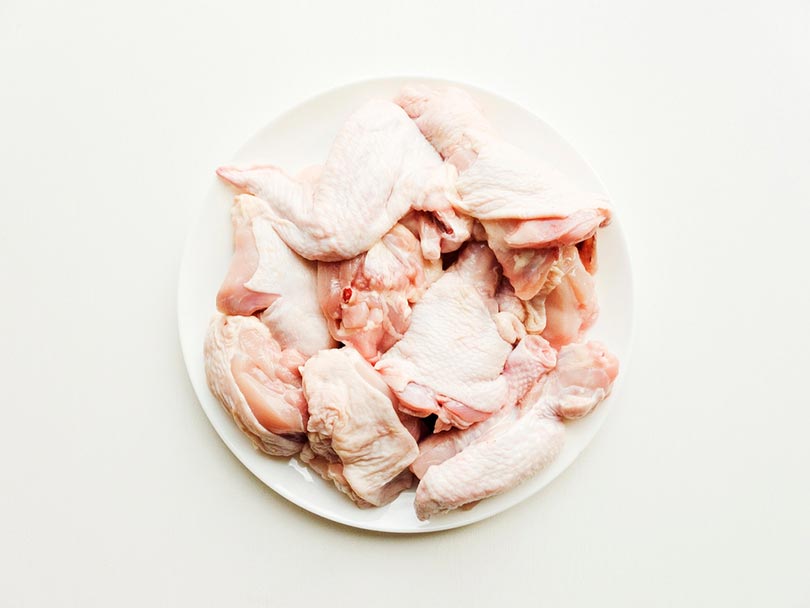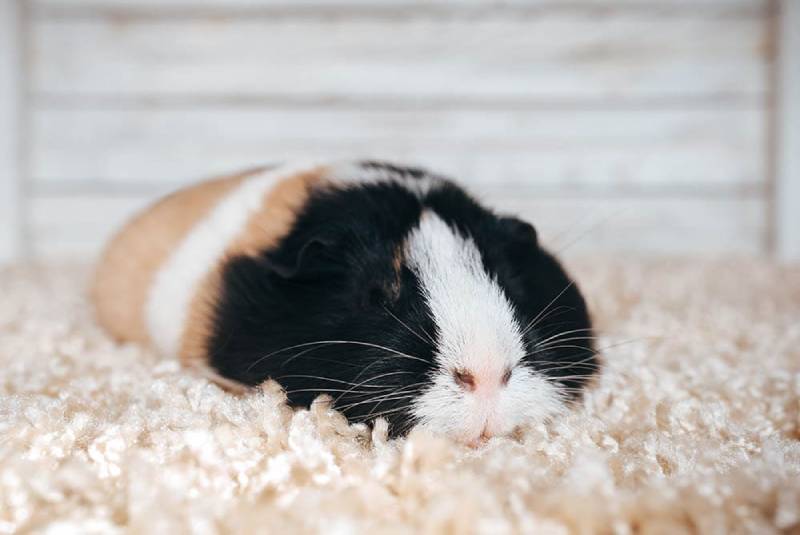Do Guinea Pigs Eat Their Poop? Facts & FAQ

Updated on
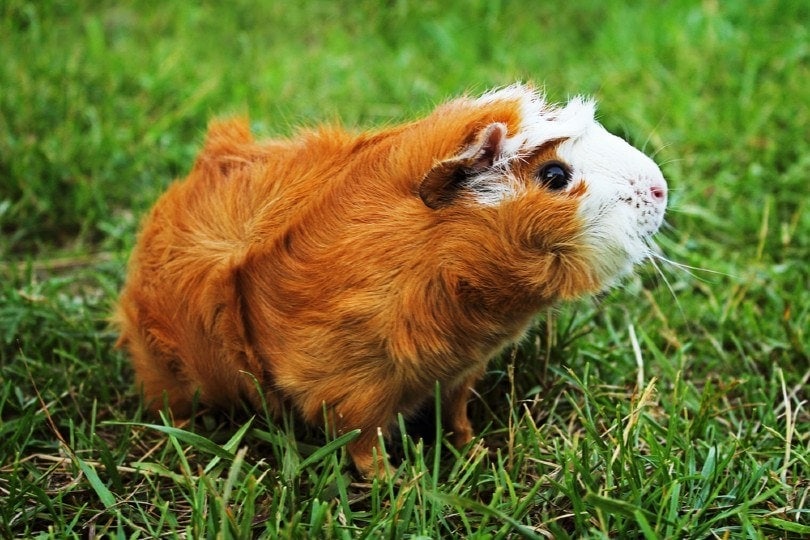
If you like spending time watching your guinea pig, you have probably been grossed out by the sight of it seemingly eating its poop. But do guinea pigs really eat their poop?
Is there any explanation behind this strange behavior?
Well, cavies eat caecotrophs,1 a compound rich in vitamins and proteins. It looks like poop and is excreted from the same area, but it’s not poop! Eating caecotrophs, also known as caecotrophy, is an integral part of the digestive processes of numerous small herbivores.
In this post, we will attempt to make sense of why guinea pigs eat their “poop”. We will also discuss why the substance they consume is crucial to their overall health and well-being.
Do Guinea Pigs Consume Their Poop?
Guinea pigs have a complex digestive system that allows them to excrete two types of pellets. Although both are dark brown, they are pretty different in their composition and texture. While the poop is dry and hard, caecotrophs are moist and squishy pellets.
Your pet can easily differentiate between the two and determine what to ingest.
Caecotrophs contain high concentrations of vitamins, proteins, and essential fatty acids. They also consist of fiber but in low amounts. Consuming these compounds is crucial to ensuring your cavy maintains a healthy gut flora balance.
Gross as it may sound, your guinea pig feeds on caecotrophs directly from its anus, although it could occasionally pick the pellets from the floor. It enjoys the substance and will be eager to give it a second chew as soon as it lands.
How Your Guinea Pig’s Digestive System Works
Once your pet chews and swallows its food, it enters the stomach and proceeds to the small intestines. Here, it is broken down, and nutrients are absorbed into the body.
Unfortunately, it is not broken down enough for your cavy to make the most out of the nutritional value of its food.
The caecum is the junction between the small and large intestines. Once food reaches this point, it undergoes a fermentation process where bacteria help to break it down further. All the extra nutrients released at this point are pooped out as caecotrophs.
Consuming caecotrophs allows your furry companion to give its food a second chew. Passing it through its stomach and small intestines once more ensures that most, if not all, of the nutrients are absorbed into the body.
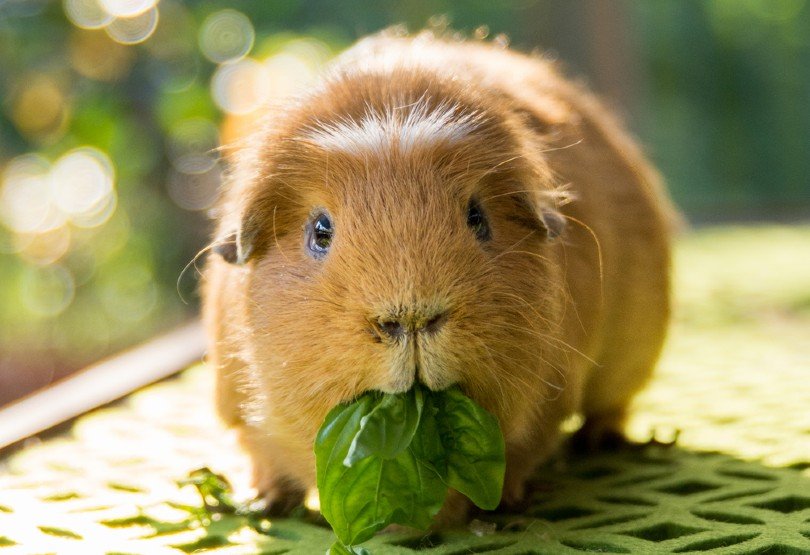
Should I Worry if My Guinea Pig Is Not Eating Its “Poop”?
Usually, it is not easy to catch your cavy red-handed in the act of consuming caecotrophs. It eats it once a day, either as the first thing in the morning or at night when you are asleep.
There is cause for alarm if you find traces of caecotrophs, especially in substantial amounts. If your cavy is not consuming the substance, it risks getting malnourished.
Generally, if your guinea pig is avoiding its caecotrophs, this implies there are problems with its gut flora. The gut flora is a healthy population of helpful microbes that help with normal digestion and hindgut fermentation.
Any time the delicate balance of gut flora is upset, it can lead to symptoms like diarrhea.
If your pet is not producing caecotrophs or is not interested in what it excretes, it likely has severe health concerns like gastric stasis2, anal impaction, or polycystic ovaries. Talk to your vet immediately for proper diagnosis and treatment.
The 5 Tips to Protect Your Guinea Pig’s Gut Health
Guinea pigs are some of the most prolific pets. Although generally healthy, they have delicate digestive systems that can affect their overall health.
Here are five essential tips to help you protect your cavy’s gut health.
1. Provide a Specialized Diet
To maintain a guinea pig’s gut health, you must keep its digestive system busy with a careful blend of digestible and indigestible fibers. Ideally, your pet should have unlimited hay and fresh water. Hay is crucial to its digestive health and also helps to prevent overgrown teeth.
Moreover, cavies need Vitamin C in their daily diets, but in moderate amounts. You can source this nutrient from leafy greens, fruits, and dried pellets.
Guinea pigs cannot manufacture their own vitamin C. If you don’t provide it in their diet, your pets can face the risk of infections and skin allergies. It can also hinder the healthy development and maintenance of joints and mucosal surfaces like gums.
Most notably, the lack of Vitamin C can cause diarrhea and affect the production of caecotrophs.
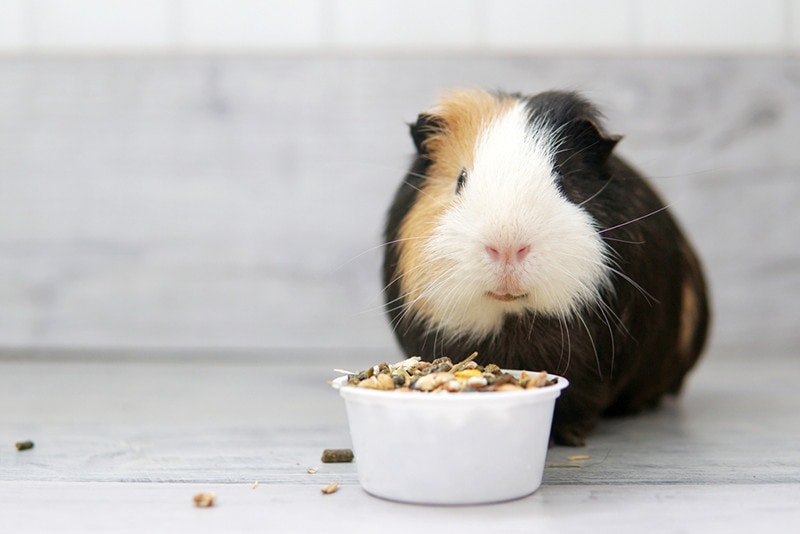
2. Include Prebiotics and Probiotics in the Diet
Prebiotics are particular plant fibers that act as food for the good bacteria in your cavy’s digestive system. They help maintain a healthy gut flora population and enhance the optimization of probiotics found in the meals.
Probiotics are good bacteria that can be added to food. They introduce good bacteria directly to your cavy’s digestive tract and help to neutralize bad bacteria. Furthermore, they boost the overall digestive health by promoting proper digestion of the ingested food.
One of the most crucial instances to provide probiotics is after your pet has had antibiotics. Although the drugs can treat infections, they kill both good and bad bacteria, leading to imbalances in gut flora. Adding probiotics to meals helps ensure your pet springs back to optimal health within the shortest time possible.
3. Provide Enough Drinking Water
Ensuring your guinea pig has a constant supply of fresh drinking water is vital. You can tell that something is amiss with its health if it doesn’t want to drink any.
Water is essential to your pet’s digestive health. It should drink 80 to 100 ml of water daily, or more if it is a pregnant or lactating sow. Also, it is common for cavies to drink a little more during the hot months.
You must check the water bowls or bottles at least twice daily, especially during the hot or cold months. Your furry friend will not have a drink if the water is too warm during the summer or it’s frozen during winter.

4. Know What Not to Feed Your Guinea Pig
Certain foods can be dangerous to a guinea pig’s overall health. These foods include junk food, caffeine, and anything high in sugar or fat. You should also ensure that the pet’s meal does not contain avocadoes, onions, garlic, potato plants, tomato leaves, or chives.
Guinea pigs have big appetites and tend to eat before they can inspect their food. This can lead to serious digestive problems that can even turn life-threatening. If you doubt whether cavies eat a specific food, leave it out until you have done your research.
5. Constantly Inspect the Poop for Digestive Issues
If your guinea pig has diarrhea, stops producing caecotrophs, or seems bloated, you should consult your vet immediately. This is an indication that something is amiss with its delicate digestive system.
The small size of guinea pigs makes them easy targets for predators. As such, they are pretty good at hiding health concerns and often don’t display symptoms like inactivity or vomiting. One of the surest ways to know if something is off is by inspecting the poop.
This should not be hard because cavies produce up to 100 poops daily!
Guinea pig poop and caecotrophs have a standard shape and look. They are brownish and have an oval shape and round ends. Any of the following anomalies can indicate digestive system issues or other health concerns.
- Tear-shaped poop (often signifies a gut problem)
- Overly dry poop (dehydration)
- Diarrhea
- Bloodstained poop
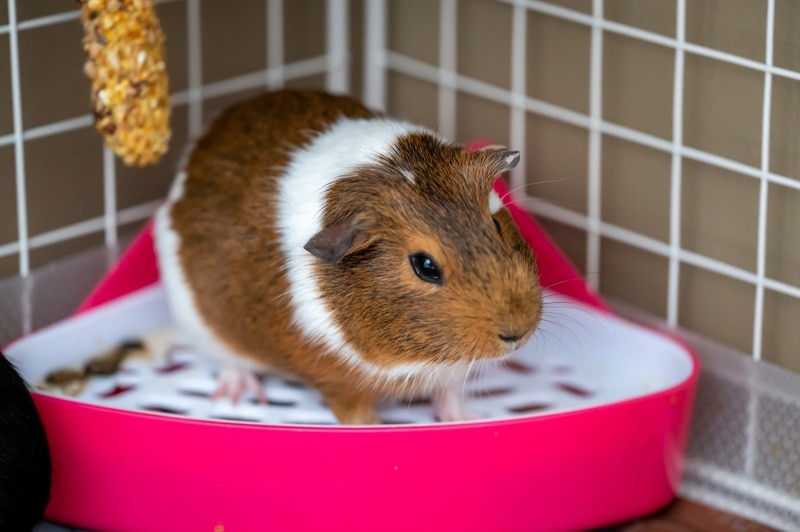
Final Thoughts
We hope you can now make total sense of why your guinea pig seems to feed on what it poops!
Strange as it may sound, the substance it consumes is quite different from poop. It packs its body with the extra nutrients it needs to remain healthy. It may sound unpleasant to humans, but it’s perfectly normal and healthy for small herbivores.
To avoid getting grossed out, think of caecotrophs as the cud that shoots back to the mouths of hooved animals like cows and deer. It serves a similar purpose; the only difference is that it comes out the rear for a second chew.
Featured Image Credit: Tettania, Shutterstock


